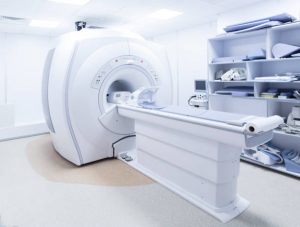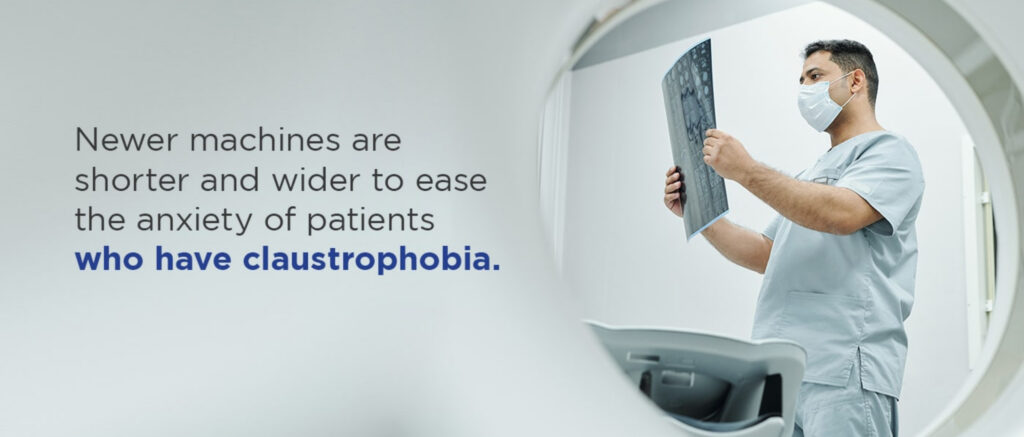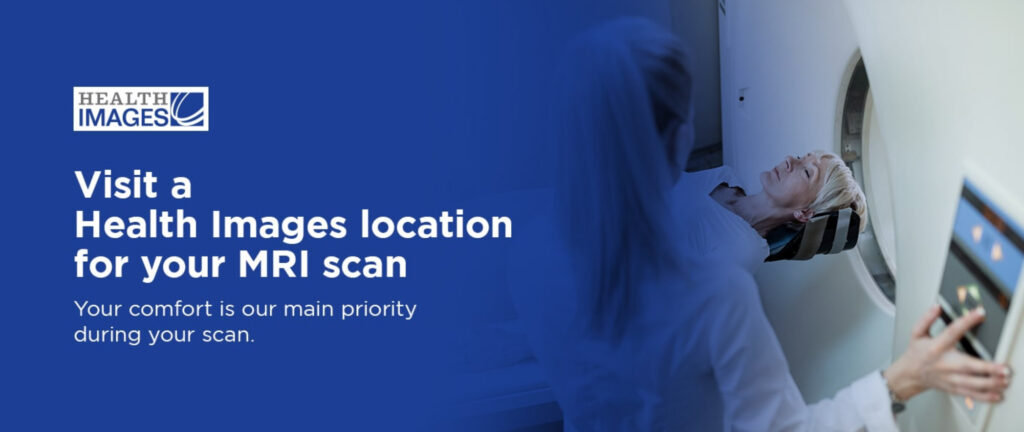Tips & Tricks to Minimize Claustrophobia During an MRI
Claustrophobia is a common condition that many people suffer from without a diagnosis. The National Institutes of Health estimates that 12.5% of the population has claustrophobia. People with claustrophobia tend to feel heightened levels of distress over dark or confined spaces or feelings of being trapped. They may also exhibit intense fears of suffocation.
With that in mind, it’s also somewhat common for people to experience claustrophobia episodes during an MRI scan. MRIs are often necessary exams for taking care of your health. When you need an MRI, it pays to know tips and tricks for reducing claustrophobia if you’re concerned about experiencing it during the scan.
In that light, here are some MRI claustrophobia tips to help you keep calm during an MRI.
1. Know what to expect
Knowing what you should expect with an MRI scan before your appointment will help you prepare emotionally and mentally for the scan. Some people may find their symptoms worsen when they are taken by surprise. Ask your doctor to explain the details of the MRI and have them clarify any questions you have.
While details may vary, here is what you might be able to expect with an MRI scan:
Before the scan
Minimal preparation is needed for an MRI procedure, though some scans may require that you avoid eating or drinking for a few hours before the exam. You will be asked to change into scrubs and remove any metal items from your person along with your phone and to disclose if you have any metal implants in your body before entering the MRI exam room. An MRI screening form will also need to be completed and reviewed by the MRI tech to ensure you’re fit to have the scan.
During the scan
Once you’re in the MRI exam room, a technologist will ask you to lie on your back on the exam table. If your upper body is being scanned, you’ll lie down with your head facing the machine. If you’re having your lower body scanned, you’ll position your feet first. The table will slowly slide into the MRI machine when you’re in position.
As the scan begins, the machine will produce some loud whirring and banging noises. These noises are normal. The scan should take approximately 30 to 60 minutes to complete. During this time, you’ll need to remain still so the images are clear. Still, you may speak to your technologist through a microphone inside the MRI if you have any concerns.
After the scan
After completing the MRI, the radiologist will analyze the images to ensure no further scanning is necessary. Once the radiologist confirms the scan was sufficient, you can go home. Your doctor will receive the scan results and go over them with you at your next appointment.
2. Learn about the MRI machine
Another way to prepare for the procedure is by learning about the MRI machine. MRIs use powerful magnets and radiofrequency (RF) energy to create clear, three-dimensional (3D) images of the organs and tissues inside your body. Various types of MRI machines exist, but most of them are shaped like a long donut.
Newer machines are shorter and wider to ease the anxiety of patients who have claustrophobia. The risk of any adverse event occurring with an MRI scan is very low.
3. Wear an eye mask
With closed or covered eyes, you may feel you can relax easier. You may even be able to fall asleep, which is an ideal state to be in during an MRI scan. Bring an eye mask with you or simply place a towel or washcloth over your eyes. With closed eyes, you may be able to stimulate feelings of being in a more familiar area and reduce any feelings of being trapped.
4. Listen to soothing music
For some MRI services, we can provide headphones that play music to help you relax. The music can distract you from the reminder that you’re in a semi-enclosed space. You can request your favorite music with your technologist.
5. Wear earplugs
If you prefer silence to music when trying to relax, you can wear ear plugs to block out the whirring and rattling noises of the MRI machine.Your MRI technologist may be able to provide you with some before the scan. Be sure to ask your technologist for earplugs if you want them.
6. Ask for a blanket
If the scan allows, you may be able to ask the technologist for a blanket. Having a blanket wrapped around you during the scan may increase feelings of security and peacefulness.
7. Focus on your breathing
Research shows deep, slow and controlled breathing can significantly reduce anxiety. Whether you practice simple breathing exercises, meditation or prayer, such practices can help you stay calm during the MRI scan.
Deep breathing increases vagal tone, which refers to the activity of your vagus nerve, which regulates your heart rate and the nerve activity in your gut. When you feel anxious, your heart rate increases and you may feel tightness in your gut. These symptoms are mitigated when your vagus nerve is stimulated.
8. Bring along someone you trust
A room full of medical strangers may increase your tendency to experience anxiety and distress associated with claustrophobia during an MRI scan. On the other hand, knowing that someone whom you love and trust is in the room or the next room over can go a long way to easing your fear and stress with the scan.
Whether it’s your spouse, parent, child or friend, consider asking a loved one to attend the scan with you. Their presence can help you maintain a sense of calm during the MRI.
9. Ask your doctor for a sedative
In some situations, medication may be the only thing that relaxes you enough to endure the MRI. Medication is often necessary if you’re worried that claustrophobia could induce a panic attack during the MRI. If you know you’ll need extra assistance with relaxation during an MRI, you can ask your doctor to prescribe a sedative to put you to sleep for your MRI scan.
10. Ask for a wide bore MRI scan
Wide bore MRI scans are shorter and wider, allowing for a more expansive imaging experience. If your MRI clinic provides this type of MRI scan, consider asking if the technologist can accommodate it for your scan. If you let your doctor or technologist know about your experience with claustrophobia, they may be able to facilitate your request for a wide bore MRI scan.
Visit a Health Images location for your MRI scan
At Health Images, our technologist and health care professionals understand and empathize with your concerns about claustrophobia from an MRI scan. That is why your comfort is the main priority for us during your scan.
If you’d like to learn more about how we can maximize your comfort during an MRI Scan at Health Images, visit your nearest Health Images location for an advanced tour of our MRI facility.






